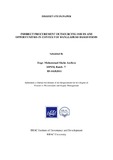| dc.contributor.author | Arefeen, Mohammad Shahe | |
| dc.date.accessioned | 2016-01-20T16:26:00Z | |
| dc.date.available | 2016-01-20T16:26:00Z | |
| dc.date.issued | 2015 | |
| dc.identifier.other | ID 14282011 | |
| dc.identifier.uri | http://hdl.handle.net/10361/4913 | |
| dc.description | This dissertation report is submitted in partial fulfillment of the requirements for the degree of Masters in Procurement and Supply Management, 2015. | en_US |
| dc.description.abstract | Outsourcing of indirect procurement is receiving much attention in Bangladesh recently. The
procurement outsourcing market is moving closer to entering a “rapid growth” phase. Yet,
not enough is known about the various factors that are driving or impeding outsourcing and
whether sufficient value is obtained or expected from outsourcing when compared with the
situation prevailing prior to or without outsourcing.
The author is on the verge of completing the 15 subjects required to obtain MCIPS from CIPS
(Chartered Institute of Purchasing and Supply) and that theoretical knowledge is applied in
Bangladesh context to develop a better understanding of the topic through an empirical survey
based study.
Procurement competence, procurement competitive advantage, firm competitive advantage
and business risk constituted the key focus areas for the study.
Respondents were picked from Bangladesh based firms and tried to limit the respondents
within members of the CIPS or IEB (Institute of Engineers)
representing various levels in the
supply chain practice within their organizations.
Data collected through the physical mailing survey method and also from some personally
known professional whose competence is beyond question, were analyzed using statistical
techniques. The total of 197 valid responses received.
The study found certain statistically significant differences between firms that have
outsourced their indirect procurement function (OS) compared to firms that have either not
considered outsourcing (NUC) or considered but decided against (CDA) or outsourced but
later in-sourced (IS) or presently have outsourcing still under consideration (UC). The
differences were found to be more widespread and significant in respect of procurement
competence, procurement competitive advantage and firm competitive advantage. They were
less pronounced for business risk and procurement-transformation-and-end-to-end
competence (the latter was found to be a separate factor within the earlier more generic,
procurement competence area). | en_US |
| dc.language.iso | en | en_US |
| dc.publisher | BRAC University | en_US |
| dc.subject | Procurement and supply management | en_US |
| dc.subject | BIGD | en_US |
| dc.subject | Indirect procurement | en_US |
| dc.title | Indirect procurement outsourcing issues and opportunities in context of Bangladesh based firms | en_US |
| dc.type | Thesis | en_US |

